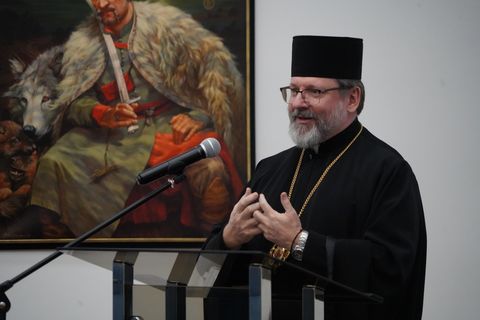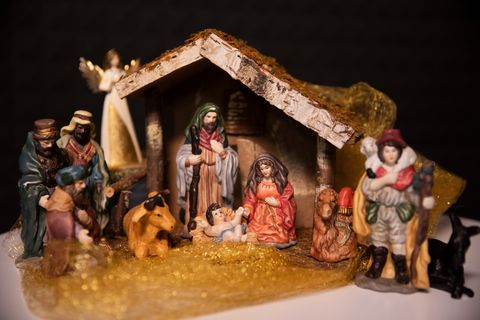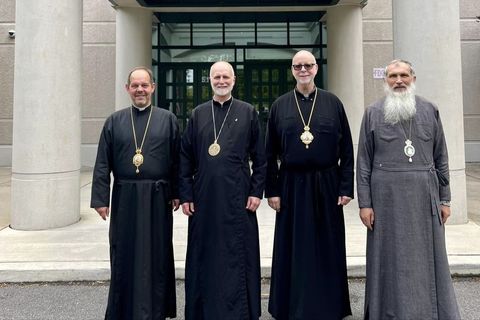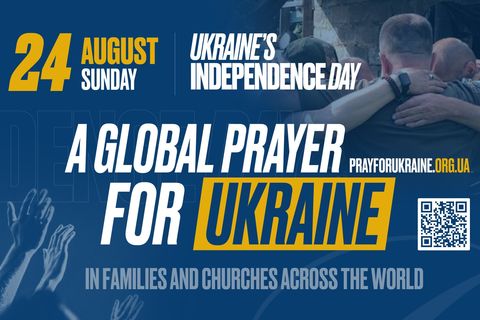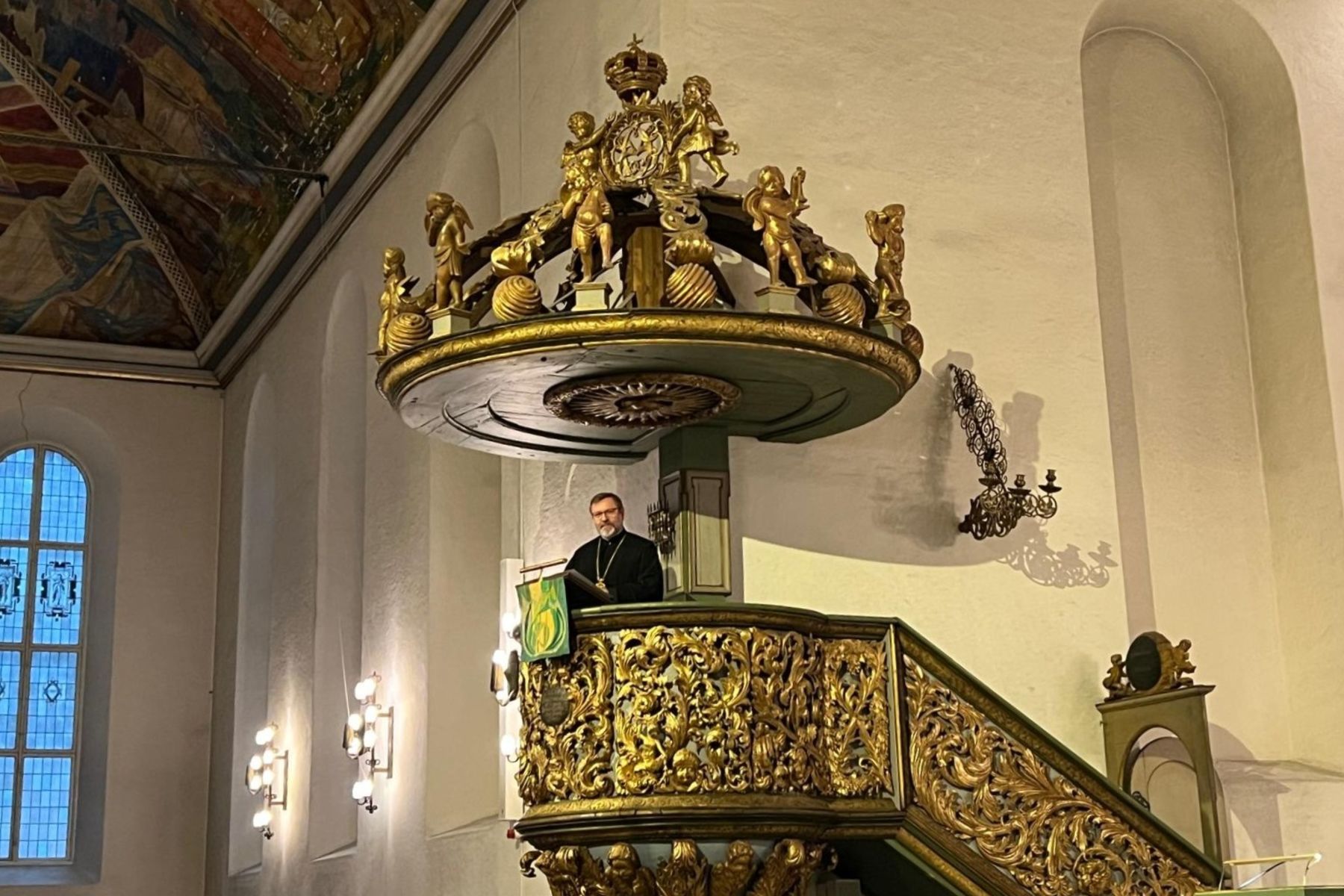
Homily of His Beatitude Sviatoslav in Oslo at the Ecumenical Prayer for Peace with Religious Leaders of Ukraine and Norway
«Let the Same Mind Be in You That Was in Christ Jesus» (Phil 2:5)
These words of the Apostle Paul that we have just heard resound with the voice of God and the spirit of the early Church. The Apostle wrote them near the end of his life and ministry, while imprisoned in Rome. He undoubtedly chose his words and imagery with great care as he addressed the first Christian community in Europe.
Many scholars believe that this passage may not have been composed by Paul himself, but rather inserted into his letter as a complete quotation — a hymn to Christ that the Church in Philippi likely knew well and sang during its liturgical worship. It is no coincidence that Paul introduces this hymn with a pastoral exhortation: «Let the same mind be in you that was in Christ Jesus.» Evidently, the thoughts and attitudes of Jesus stood in stark contrast to the mindset that prevailed as the «mainstream» in that city.
At the time this letter was written, Philippi was an important Roman military colony located on one of the great transport arteries of the ancient world—the Via Egnatia. This road connected the Adriatic Sea with the Aegean, and later linked Rome with Constantinople. The city’s inhabitants were mostly soldiers or veterans of the Roman army. Their worldview reflected the values of a militarized society, in which glory and power placed one at the top of the social pyramid, where privileges and military ranks were earned on the battlefield and regarded—together with plundered wealth—as inviolable rights that gave meaning and dignity to their lives. The mentality cultivated there drove everyone upward, for only there, in their view, resided power and glory. Only before those at the summit did every knee below bow down—whether willingly or under compulsion and fear.
To these Philippians, the Apostle Paul proclaims Christ, who «though He was in the form of God, did not regard equality with God as something to be grasped, but emptied Himself, taking the form of a servant, being born in human likeness. And being found in human form, He humbled Himself and became obedient to the point of death—even death on a cross.» To those striving to ascend, Paul preaches the One who chose to descend.
Christ did not consider His existence in the divine nature to be an «inviolable privilege.» In speaking of Him, Paul uses the word harpagmon (ἁρπαγμὸν)—a term evoking the prey of a predator clutched tightly in its claws, unwilling to release it to another. Christ’s appearance in the form of a servant is thus a movement, an action, a process of voluntary self-emptying. Using the word ekenosen (ἐκένωσεν), Paul literally speaks of an «emptying»—a renunciation of all power and privilege flowing from His equality in divinity with God the Father.
The goal of this descent of the Son of God is death on the cross—the most shameful and humiliating of deaths, reserved as punishment for slaves and known as servile supplicium.
To the Philippians, Paul proclaims «Christ crucified: a stumbling block to Jews and foolishness to Gentiles, but to those who are called, both Jews and Greeks, Christ the power of God and the wisdom of God» (1 Cor. 1:23–24). The Apostle reveals a divine paradox: the crucifixion on the cross—the lowest point of humiliation in Christ’s descent—becomes the very moment of glorification and ascent. What appears to human eyes as shame becomes the hour when the Father glorifies His Son, bestowing on Him «the name that is above every name, so that at the name of Jesus every knee should bend, in heaven and on earth and under the earth, and every tongue should confess that Jesus Christ is Lord.»
Dearly beloved in Christ! Today Ukraine—our people and our Churches—are walking the path of kenosis proclaimed to us in this Word of God. Every loss of a loved one, every destroyed city and village, leaves in our hearts an irreparable emptiness that nothing can fill. The whole world witnesses Ukraine’s tragedy: some with awe, others with indifference; still others raise their hands in helplessness and turn our pain and suffering into material for media battles and manipulations, using it to polarize their own societies and gain political advantage.
Today our nation endures its own crucifixion before the eyes of the world community, and it seems to us that the Apostle Paul speaks precisely about us when he says: «We have become a spectacle to the world, to angels and to mortals» (cf. 1 Cor. 4:9). Yet the power and glory of the Lord’s Cross are revealed in our sufferings—and in our word of hope, both for Ukraine and from Ukraine, to contemporary humanity.
We are bleeding, and once again we ask ourselves: God, why? Perhaps this question—Why must we, Ukrainians, be crucified before the eyes of the whole world today? — stands at the very center of reflection for all people of goodwill, both believers and non-believers alike. God, why do other nations live, develop, rejoice, and flourish, while we must die night after night? Why does the blood of infants flow on Ukrainian soil? God, why?
Perhaps the final answer to this question will be revealed only at the Last Judgment, when all that is hidden will come to light. Yet even now, the key to understanding this tragedy lies in the holy and life-giving Cross of Christ.
One of the most profound responses to this mystery was voiced this year during the Prayer Breakfast in Kyiv on Independence Day, when people from around the world came to pray with us, with our leaders, to listen to the Word of God, and to celebrate the Independence of our Motherland.
A man named Maksym Kulyk from Kryvyi Rih stepped forward—a husband and father who had suffered a tragedy like that of the Bazylevych family in Lviv. In one night, during a Russian missile attack, he lost his wife and three children. His youngest daughter, Uliana, was only two months old.
That father asked: My God, why did this happen to me?
Someone might respond: It is because of your sins that you must suffer so. But he answers:
«No, that is not true! Other nations that today live in prosperity are neither more nor less sinful than the Ukrainian people.»
«I am convinced that today the Lord is glorifying and exalting Ukraine through suffering and placing our wounds before the eyes of the whole world. He is saying to all who wish to stand on the right side of history: „Do not turn your eyes away from the suffering, the blood, the pain of Ukraine.’“
«It is precisely for this reason that God wants the world today to see Ukrainians—to see our deeply believing hearts, and to recognize in every corner of the world the believing soul of Ukraine.»
In us today, this divine paradox is being fulfilled once again: the crucifixion on the cross—the lowest point of humiliation in the descent—has become the moment of glorification and ascent.
Today, together with representatives of the All-Ukrainian Council of Churches and Religious Organizations, we wish to express our heartfelt gratitude to all Christians of Norway and to all people of goodwill for their solidarity with Ukraine. Thank you for showing in your compassion toward us «the same mind that was in Christ Jesus» (cf. Phil. 2:5).
Amid the tragedy of this war—this blasphemy against God and crime against humanity—we recall the words of the Portuguese Prime Minister, the Marquis de Pombal, spoken after the earthquake that shook Europe in 1755: «Let us bury the dead and feed the living.» May this become the motto of our shared mission of Christian mercy—to end the war and to save Europe from yet another catastrophe.
May our suffering, and our common witness to the Gospel of Christ, serve the purpose that «at the name of Jesus every knee should bend, in heaven and on earth and under the earth, and every tongue confess that Jesus Christ is Lord, to the glory of God the Father.»
Amen.
† SVIATOSLAV
